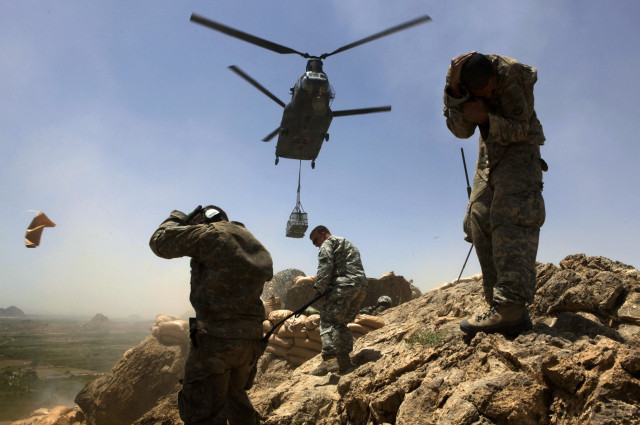Many Afghans, from government officials and parliamentarians to the common man are disgruntled with the US officials relentlessly accusing them of being corrupt - while ignoring their own government’s fraud and misappropriations in the $56 billion development budget approved by the Congress for the reconstruction of Afghanistan. Afghans deem US responsible for corrupting their society.
For Obama’s administration, ‘corruption warnings’ are a new blackmail tool to use against the Karzai government. There has been constant rhetoric to “eradicate corruption” and “stop misusing US tax payers’ money,” without realising that only 20% of the allocated funds are at the disposal of the Afghan government while 80% are utilised by the US Department of State, Defence and USAID. These three departments rely extensively on private contractors for the implementation of various projects, ranging from reconstruction of Afghanistan, eradicating drugs, training of Afghan security forces and officials and providing security to Nato supply convoys.
Since 2001, the US congress has appropriated nearly $56 billion for the reconstruction funds of Afghanistan, which cannot be tracked down. It has either been wasted, stolen or abused.
Missing records
There is absolutely no record of the amount utilised from 2001 to 2006 except for the vague documentation of $17.7 billion spent during the financial year 2007 – 2009, which only identifies the 7000 contractors hired to implement the projects – but does not evaluate the projects. Therefore, there is no guarantee if the US tax payers’ money amounting to $56 billion is fairly spent or abused.
Bush’s government after eight years of engagement in Afghanistan established the Office of the Special Inspector General for Afghanistan Reconstruction (SIGAR) in 2008 “to conduct independent and objective audits, inspections, and investigations on the use of taxpayer dollars and related funds”.
Even the Office of the Special Inspector General is unable to track down the money spent during 2001 to 2006. It recently released a report on the “waste, fraud and abuse” of $17.7 billion (spent during the financial year 2007 – 2009) of the total reconstruction fund of $56billion.
The report is essentially a document holding the US responsible for the corruption in Afghanistan. “The large US investment in Afghanistan remains at risk of being wasted or subject to waste, fraud and abuse,” reads the document.
Who benefits from America's wars?
65 per cent of the $17.7 billion has been channelled through the Department of Defence, which hired largely those companies who are essentially part of the Military Industrial Complex (MIC). These huge corporations depend mostly or entirely on the Pentagon for their profits and have hugely benefited from the US wars.
It has been a known fact that Bush-Cheney administration had direct financial interest in these companies. Vice President Cheney was the CEO of Halliburton for over five years that profited the most out of the Iraq war.
Some of the largest defense contractors belonging to the Military Industrial Complex hired by the Defence Department, for Afghanistan are DynCorp, Black Water (Xe Services), Lockheed Martin, Northrop Grumman, Raytheon, Louis Berger and Bearing Pont.
It is believed that some companies like Lockheed Martin and Raytheon draw close to 100 per cent of their business from defence contracts.
Since last year, more defence contractors belonging to the MIC have been added to the list to benefit from the war in Afghanistan. Along with the Department of Defence, the State Department also supports the companies belonging to the complex.
Imagine the billions of dollars DynCorp has earned in the past ten years, considering $1.8 billion it earned in two years from a single project of drug eradication, which was administered by State Department. DynCorp is involved in multiple projects in Afghanistan.
US wars are largely dictated by the MIC. President Eisenhower in his farewell address on 17 January 1961 warned the US nation against this complex to never let it “endanger our liberties or democratic process. We must guard against the acquisition of unwarranted influence, whether sought or unsought, by the military-industrial complex.”
The war in Afghanistan could have been avoided
Several diplomats in Kabul believe that the war in Afghanistan could have been avoided if it wasn’t supported by the powers associated with MIC. United States could have followed the policy of “reconciliation and reintegration” in 2001, that it is compelled to follow now. But even now the efforts for the reconciliation with Taliban are constantly being disrupted by the strategy adopted by the Department of Defence.
As the war-oriented economy brings advantages to some powers in the US, some elements in Afghanistan who oppose reconciliation with Taliban are benefiting immensely from the situation – living the lavish life style which they couldn’t afford otherwise.
Besides the Military Industrial Complex, there is also the intelligence complex which has been playing a greater role in corrupting the Afghan society since 2001, whose billions of dollars of expenditure has never been accounted for.
The intelligence complex’s profligate distribution of boxes and suitcases of cash amongst the different segments of Afghan society – Afghan media, NGOs and allegedly government officials - has also encouraged other countries. India is one of the countries which has taken a leaf out of the CIA’s book.
Such notorious tactics used by powerful elements of the US system are further deteriorating the Afghan society and undermining the long term goals “to develop governing capacity of Afghans and foster economic development.”
Lack of transparency
This is still not the complete picture of US corruption and lack of oversight of reconstruction funds - meant for achieving long term goals in Afghanistan. There is no transparency even in the salary support provided to the Afghan government employees and technical advisors since 2002. The US government is unable to determine the amount it has been paying, the identity and the total number of recipients. Since the number and identity of the recipients is not clear the salaries can go to anyone in anyone’s name.
The audacity of the Obama administration is that with the deteriorating economy and historic unemployment in the US, it has requested for an additional $16.2 billion, which would bring the funding for reconstruction of Afghanistan to more than $72 billion.
The additional funds are more likely to be spent to achieve the hidden goals of some powers than the long term ‘stated’ goals of US government in Afghanistan
Afghans point finger at US: Who's corrupt now?
Given the advantages US wars bring to certain interest groups, it is not surprising that their presence persists.



COMMENTS
Comments are moderated and generally will be posted if they are on-topic and not abusive.
For more information, please see our Comments FAQ